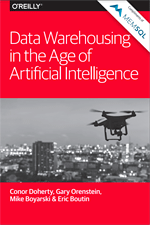1. Awesome AI security
|
| Here's a list of AI security resources.
|
2. How to escape saddle points efficiently
|
"A core, emerging problem in nonconvex optimization involves the escape of saddle points....The critical open problem is one of efficiency." Chi Jin and Michael Jordan describe a solution, explaining that "rather surprisingly, GD augmented with suitable perturbations escapes saddle points efficiently; indeed, in terms of rate and dimension dependence it is almost as if the saddle points aren't there!" These results could be applied to many machine and deep learning applications.
+ Check out Michael Jordan's keynote, How to escape saddle points efficiently, tomorrow at the AI Conference in San Francisco.
|
3. AI gaydar?
|
It was hard to miss the news last week that an algorithm deduced the sexuality of people on a dating site with up to 91% accuracy. It's a nifty parlor trick with serious ethical implications. There is the potential for misuse—the outing or discrimination of acquaintances, or interviewers using AI to get information they can't legally ask—compounded by a misunderstanding by people unfamiliar with probabilistic outputs. There were dozens of articles on the topic. Here are just a couple:
|
4. How to find meaning in GANs
|
Artificial intelligence is emerging as a creative force; in the process, it reveals something of itself.
+ Learn to build your own generative adversarial network using TensorFlow, with this free interactive tutorial, "Generative adversarial networks for beginners."
|
Our Skynet moment
|
 Are we already living inside a proto-AI that is hostile to humanity? In his new book, WTF? What's the Future and Why It's Up to Us, Tim O'Reilly makes the case that we've already built Skynet, but there's still time to bring it back under control. Platforms like Google, Facebook, and most importantly, our financial markets already shape our decisions and our knowledge of the world. Tim is speaking about this at the AI Conference in San Francisco this week, but if you want to read the extended argument, which starts at Google Brain, draws lessons from Facebook's misadventures with fake news, and then looks at how Wall Street's master objective function has wreaked havoc on the human economy, preorder the book now, or sign up for Safari (if you aren't already a subscriber). |
5. Letting Siri's "personality shine"
|
| Siri got a voice upgrade. On-device deep learning provides realistic speech patterns with the subtle nuances that you'd expect to hear from a real person. Here's how Apple's engineering team did it.
|
In collaboration with MemSQL
Free ebook: Data Warehousing in the Age of Artificial Intelligence
|
 This practical ebook, compliments of MEMSQL, will guide you through building and deploying scalable, production-ready artificial intelligence applications. You'll find AI use cases, code samples to help you get started, and an outline of high-throughput data-processing architectures necessary for developing AI applications. |
6. "One of the most lucrative partnerships ever"
|
| "In one of the most lucrative partnerships ever between a corporation and a university, IBM will team up with MIT to engage in 10 years of 'fundamental AI research.' The $240 million deal will go toward the MIT-IBM Watson AI Lab, a mix of IBM researchers and 100 MIT academics working at the MIT campus in Cambridge, Massachusetts."
|
7. Facebook and Microsoft introduce new open ecosystem for interchangeable AI frameworks
|
| The Open Neural Network Exchange (ONNX) format is a standard for representing deep learning models that enables models to be transferred between frameworks.
|
8. The Quartz guide to artificial intelligence
|
| What is AI, why is it important, and should we be afraid?
|
AI Conference news
|
The AI Conference in San Francisco is sold out. Watch keynotes live on Facebook beginning Tuesday, September 19.
Interested in speaking at the AI Conference in New York? It's happening April 29–May 2, 2018. (Save the dates.) The Call for Speakers is now open.
|
9. Voice assistant hack: Ultrasound
|
| "You may have thought that you'd be able to hear any rogue attempts to control your increasingly powerful voice assistant. But it turns out that the hardware and algorithms used to control devices like Amazon's Echo speaker or Apple's Siri can actually hear commands issued via ultrasound, which is above the range of human hearing."
|
10. Taryn Southern's AI-composed aIbum
|
Taryn Southern is working on a new album, I AM AI. It's the first LP to be entirely composed and produced with AI. She used an open source AI platform called Amper Music to create her recently released single "Break Free" but she's experimenting with several programs.

|